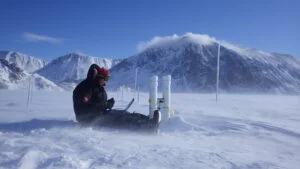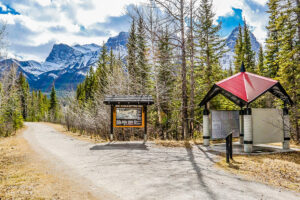
Science & Tech
20 Canadian innovations you should know about
Celebrating Canadian Innovation Week 2023 by spotlighting the people and organizations designing a better future
- 3327 words
- 14 minutes
Travel
Robin Esrock investigates the growing trend of alcohol-free wine, beer and spirits

Angela Hansen pulls a bottle of bubbly out of the fridge, unwinds the wire cage, and pops the cork. It’s a spumante from Italy, with crisp fruit on the nose and a smoother finish than I’m used to with sparkling wine. Next, Angela opens a full-bodied cabernet sauvignon from Spain, and a refreshing South African sauvignon blanc. Putting the wine to one side, in come the gin and tonics, tequila, whisky colas, IPAs, and a few liqueurs to balance an immaculate charcuterie board. Joined by my wife and Angela’s husband Enrique, we’re boozing hard, with one striking difference: every drink has been de-alcoholized. Welcome to Mocktails, Vancouver’s first alcohol-free liquor store.

The low and non-alcoholic sector has exploded into a $13-billion-dollar global industry, recording staggering year-over-year growth, with Canadians among its top international consumers. According to NielsenIQ, the overall market grew by more than 35 per cent in 2023, and 120 per cent over the past three years. It’s already scooped up 10 per cent market share in Spain and Germany. Industry research shows that Millennials and Gen-Z consumers are increasingly looking for booze-free alternatives, a trend driven by factors like cost, diet, legal cannabis consumption, and a positive awareness of mental health. Supply is growing to meet this demand in the form of de-alcoholized spirits, mixes, wines and beer that, compared to products of the past, actually taste good. Better distillation and brewing techniques, sophisticated food science, and elegant bottling are creating a new world of beverages: light on calories, high on taste, with no or low alcohol, and zero hangovers.
Located on buzzy Commercial Drive in East Vancouver, Mocktails is one of a handful of exclusively non-alcoholic bottle stores around the country. Proprietor Angela has a backstory that is very familiar to her clientele. “After decades of unhealthy drinking, and many attempts at quitting, one day I woke up with another hangover and knew I was done with drinking. I knew I didn’t want to do this anymore, I couldn’t do this anymore,” she tells me. “I didn’t get sober because it was trendy; I did it because I had to.”
Looking for alternatives, she discovered the rabbit-hole of non-alcoholic spirits and drinks. Booze was flowing during the pandemic, and knowing she wasn’t alone, Angela explored the idea of an alcohol-free liquor store. Initially, banks and realtors were skeptical of her business plan, but since opening her doors, the response has been overwhelming.
“We got 500 Instagram followers just today,” beams Angela. She was also surprised to learn that many ‘non-alc’ companies and distributors are female owned, operated, or led.


“Women seem to have a different and complicated relationship with alcohol. We tend to hide our issues more. It’s not as acceptable to be a female heavy drinker as a male heavy drinker,” she says. “Maybe women are not as resistant to trying something new, but we all need and deserve this — as sober people, and as non-sober people.”
Drinking usually comes down to occasions and locations: crushing a pub beer after a hike is a different world from sipping fine wine in a restaurant. Across countless dates, celebrations, meals and parties, alcohol is consumed to enhance personal connections, but it remains the root of many health and societal issues. In the world of the sober curious, nobody expects one to go cold turkey. Enrique, who still drinks casually, points to the value of alternating between non-alcoholic and alcoholic beverages, maintaining the feel-good effects of moderate alcohol consumption without toppling over the edge. By the third glass, will you notice the switch from a 7.6% IPA to Strange Fellows Brewing’s excellent Never the Less IPA (0.5% ABV)? I enjoy the taste of beer, and these days I can drink a de-alcoholized hazy pale ale – my go to is Victoria-based Phillips Brewing’s excellent Iota – guilt-free at family dinners. It reminds me of ancient Rome’s symposium, where wine was diluted with water, allowing spirited discussions to continue all day without everyone getting plonked. Social connection was the point, not inebriation.

Consumers might be surprised by the equivalent cost of de-alcoholized drinks, but it’s actually more expensive to produce a good low or alcohol-free wine, spirit or beer. The traditional product undergoes an extra vacuum or steam distillation process, applying heat to carefully burn off the alcohol, leaving complex, familiar tastes behind. Botanicals and natural flavouring can also be added, as in the case of gin, whisky or tequila. I sample a golden hued tequila that uses capsicum to substitute that familiar burn on the finish. We try two new liqueur products from the U.K. that are hard to pin down: sugar-free, vegan, and with no artificial flavours, the tropical notes beg to be mixed into a “gin” and tonic. Mocktails can be a whole lot more interesting than Shirley Temples and virgin Caesars.
Angela cracks open a few ready-mixed cans of gin and tonic, margaritas, and whiskey colas, all of which do a capable job of mimicking the real thing. Sipping slowly, I’m left with the distinct impression I’m drinking booze, not soda.
“It’s funny, but it’s often the whisky-cola that turns the curious into believers,” says Angela, who hosts weekend tastings at her store. “Some people have a lot of resistance, but things have changed so much. It’s no longer fake wine and sour juice. We’re offering a wide variety of quality products in an exclusively dedicated non-alcohol establishment, not a just a section in the back of a grocery store or variety store. We wanted to honour and spotlight the industry and these incredible products.”
As more bars and restaurants expand their low or non-alcoholic menus to accommodate a growing clientele, Canadian entrepreneurs and beverage consumers are stepping up to the plate. There’s Nova Scotia’s Lake City Cider, the Libra line from Prince Edward Island’s Upstreet Brewing, Alberta’s One for the Road Brewing, Stratford, Ont.’s Sobrii gin. You’ll find quality mixers and spirits from HP Juniper and Atypique in Quebec, Toronto’s ABOVE, Wild Folk in Calgary, the list goes on. There are extensive online marketplaces like Sansorium, retail stores like Bevees in Port Coquitlam, B.C. and Sobr Market in Winnipeg, and, for the curious, an excellent online resource called Some Good Clean Fun. Investors are taking note too: Partake Brewery and others have raised significant capital from Canadian and international investors. Meanwhile, multinational alcohol giant Diageo acquired Seedlip, a leading U.K.-based dealcoholized spirit brand, and has launched non-alcoholic versions of Guinness and Tanqueray gin. Keurig Dr Pepper acquired Quebec’s Atypique, and Costco Canada are stocking flats of Ole mocktails.

Joining sober-curious younger generations are members of older generations like myself, who might be called the calorie-curious. A typical IPA has between 200 and 300 calories per can; a dealcoholized IPA has just 70. An average glass of sauvignon blanc has 120 calories. The glass I try inside Mocktails — served cold from a can — has just 25. Who wouldn’t want booze that’s benevolent to the waistline?
Joining Angela are retail entrepreneurs like Gail Lynch, who popped up her Zero Cocktail Bar in Toronto’s Regent Park. She invites guests to “come for the cocktails, and stay for the chat.” Here, community and conversation trump overindulgence. In my journeys around the planet, I’ve personally found the best drinks are accompanied by the best company. Wine never tastes as good as in a winery, with a winemaker sharing his passion for the craft. Brewery and distillery tours are fascinating because we meet the faces behind the labels, creating a meaningful and personal connection with the beverages we consume. Ambiance can make a great cocktail greater, but the stories we share drinking it… well, they make the greatest.
Back in Mocktails, the store shows signs of a solid party, with empty bottles and glasses scattered about. After decades of social drinking, my brain fully expects to be tipsy, and somehow, I feel the phantom limb of an alcoholic buzz. This time, however, I can safely drive home, get a solid night’s sleep, and wake up feeling refreshed. Angela believes that those who struggle with alcohol — or simply want a healthier choice of beverage — can fully participate in social gatherings without stigma or a sense of missing out. Expect dealcoholized drinks to increasingly pop up at events, dinner parties, restaurants and milestone celebrations. Whether you drink or not, don’t be surprised when the next best thing turns out to be even better.
Are you passionate about Canadian geography?
You can support Canadian Geographic in 3 ways:

Science & Tech
Celebrating Canadian Innovation Week 2023 by spotlighting the people and organizations designing a better future

Travel
The trail started with a vision to link Canada coast to coast to coast. Now fully connected, it’s charting an ambitious course for the future.

Places
It’s an ambitious plan: take the traditional Parks Canada wilderness concept and plunk it in the country’s largest city. But can Toronto’s Rouge National Urban Park help balance city life with wildlife?

Wildlife
Canada jays thrive in the cold. The life’s work of one biologist gives us clues as to how they’ll fare in a hotter world.